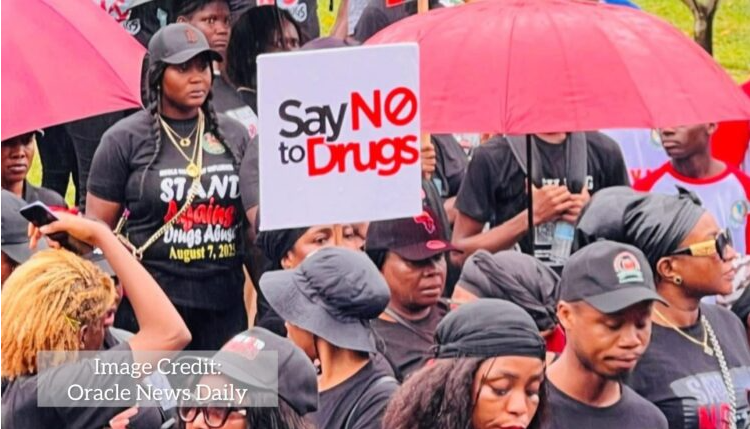On August 7:Thousands Storm Capitol Building to “Say No To Drugs”

In a resounding call for justice, thousands of Liberians flooded the grounds of the Capitol Building on August 7, 2025, in a fiery and passionate protest, demanding urgent government action against the alarming rise in drug trafficking and substance abuse across the country. Despite the rain, the crowd comprising students, parents, community leaders, civil society activists, religious figures, and survivors of drug addiction echoed one unified demand: “Drug dealers, send them to prison!” Described as one of the largest grassroots movements in recent years, the protest was marked by powerful chants, emotional testimonies, and placards that painted a grim portrait of how deeply drugs have penetrated Liberian communities. Messages like “Stop killing our future,” “No more excuses, no more silence,” and “Liberia must be drug-free” filled the Capitol grounds as protestors marched from across Monrovia to demand change. The demonstration was spearheaded by a coalition of civil society organizations, youth and women’s groups, religious institutions, and advocacy networks united under a common front to confront what they have declared a “national crisis of substance abuse.” Protesters demanded the full implementation of the Controlled Drugs and Substances Act of 2023 and called for the establishment of a special fast-track court to prosecute drug-related crimes. Many participants expressed frustration over what they described as a tepid and inconsistent response from authorities to a crisis that is destroying lives, fueling violence, and robbing young people of their future. “This is not politics. This is survival,” said Marian Toe, a youth advocate from Paynesville. “Our brothers and sisters are dying every day. The ghettos are full of children with no hope. Drug lords walk free while communities are buried in addiction.” Survivors of substance abuse gave emotional testimonies. One young man, Emmanuel, revealed, “I lost seven years of my life to kush. I was written off by society. But I made it out, and I will not stand by while others fall.” Religious leaders also lent their voices, offering prayers and urging moral responsibility. “This is not just a legal issue; it’s a moral and spiritual crisis,” declared Rev. Samuel Flomo of the Interfaith Council of Liberia. “We must all take responsibility churches, mosques, homes, schools. But the government must lead with strength and vision.” Civil society actors highlighted the absence of proper rehabilitation facilities, lack of psychosocial support services for addicts, and weak border control mechanisms that allow dangerous narcotics to enter the country unchecked. In a strong show of international solidarity, the United States Embassy near Monrovia issued a statement of support: “As Liberians throughout the country take to the streets today to unite against the alarming surge of drug use and trafficking in Liberia, the U.S. Embassy commends civil society groups and community organizations for raising their voices to draw attention to this critical issue and for taking a stand to safeguard Liberia’s youth, communities, and future generations.” The Embassy’s backing underscored growing concern among international partners and a willingness to assist Liberia in tackling the drug crisis. Inside the Capitol Building, lawmakers reportedly watched as the protest unfolded. Demonstrators delivered a petition demanding:
- Immediate enforcement of the anti-drug law.
- Creation of a special fast-track court for drug-related offenses.
- Expansion of rehabilitation programs nationwide.
- Increased budgetary support for the Liberia Drug Enforcement Agency.
- Enhanced collaboration with international agencies to curb drug importation.
Montserrado County District #8 Representative, Hon. Prince A. Toles, who received the petition, called it “the most significant petition from the citizens regarding the drug crisis in the nation.” He added, “We stand with our citizens and will take decisive action to safeguard our country’s future.” As the protest ended peacefully in the early afternoon, organizers issued a firm ultimatum: if the government fails to act within days, a series of nonviolent actions will be launched across the country. “This is just the beginning,” warned Esther Johnson of the Women United Against Drugs movement. “We will not rest. We will not stop. We will not be silenced. If our children are not safe, no one in power should sleep soundly.” August 7’s protest was more than a demonstration it was a movement. A bold demand for action. A collective awakening. As Liberia stands at a crossroads, the voices heard on that rainy day outside the Capitol reflect a nation’s deep yearning for justice, accountability, and a future free from the chains of drugs.


